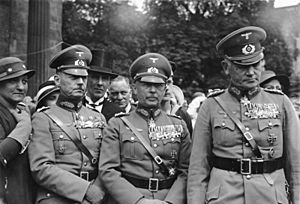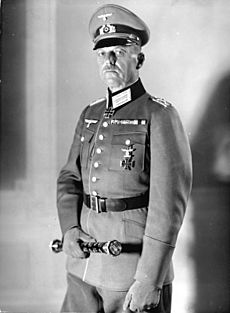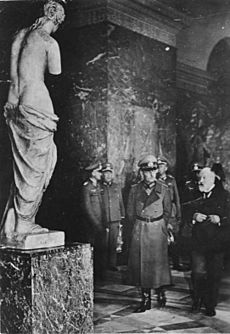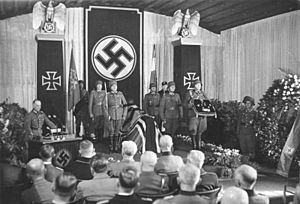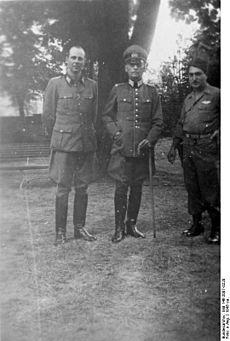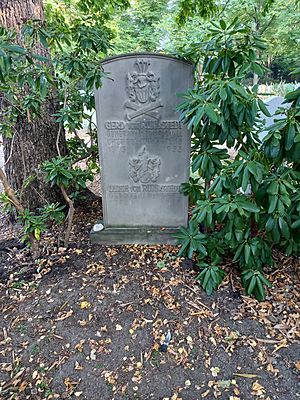Gerd von Rundstedt facts for kids
Quick facts for kids
Gerd von Rundstedt
|
|
|---|---|
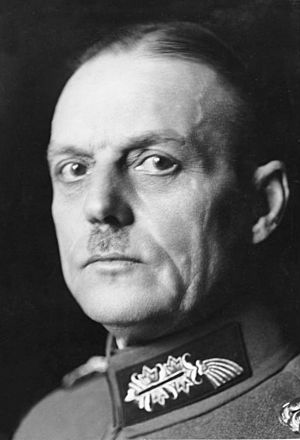
Rundstedt in 1932
|
|
| Birth name | Karl Rudolf Gerd von Rundstedt |
| Born | 12 December 1875 Aschersleben, Province of Saxony, Kingdom of Prussia, German Empire |
| Died | 24 February 1953 (aged 77) Hanover, Lower Saxony, West Germany |
| Buried |
Stöckener Cemetery
|
| Allegiance |
|
| Service/ |
|
| Years of service | 1892–1945 |
| Rank | Generalfeldmarschall |
| Commands held |
|
| Battles/wars |
See battles
|
| Awards | Knight's Cross of the Iron Cross with Oak Leaves and Swords |
| Spouse(s) |
Luise "Bila" Agathe Marie von Götz
(m. 1902) |
| Children | 1 |
| Relations | Gotthard Heinrici (cousin) |
| Signature | |
Karl Rudolf Gerd von Rundstedt (born December 12, 1875 – died February 24, 1953) was a German field marshal during World War II. He came from a Prussian family with a long history in the military. Rundstedt joined the Prussian Army in 1892. During World War I, he mostly worked as a staff officer, helping to plan military operations. After the war, he continued his army career and retired in 1938.
He was called back to duty when World War II began. He led Army Group South during the invasion of Poland. Later, he commanded Army Group A during the Battle of France. He was promoted to Field Marshal in 1940. In the invasion of the Soviet Union, he led Army Group South. His forces achieved a huge victory at the Battle of Kiev. He was briefly removed from command in December 1941 but was called back in 1942 to be Commander-in-Chief in the West.
He was dismissed again after Germany's defeat in Normandy in July 1944. However, he was recalled one more time in September to his post as Commander-in-Chief in the West. He held this position until Adolf Hitler dismissed him for the last time in March 1945. Rundstedt knew about some plans to remove Hitler from power, but he did not support them or report them. After the war, he was released in 1949 and passed away in 1953.
Contents
- Early Life and Military Beginnings
- World War I Experience
- Between the World Wars
- Serving the Nazi Government
- World War II Campaigns
- Invasion of Poland (1939)
- Invasion of France and the Low Countries (1940)
- Planning the War Against the Soviet Union (1941)
- Operation Barbarossa (1941)
- Command in the West (1942-1944)
- Defeat in Normandy (1944)
- Plot to Kill Hitler (1944)
- Return to the West (1944-1945)
- Ardennes Offensive (1944-1945)
- Defence of the Rhine and Final Dismissal (1945)
- After the War
- Dates of Rank
- Awards
- Images for kids
- See also
Early Life and Military Beginnings
Gerd von Rundstedt was born in Aschersleben, a town in what was then Prussian Saxony. He was the oldest of four brothers, all of whom became army officers. His family, the Rundstedts, were an old noble family with a long tradition of military service. Almost all the men in his family had served in the Prussian Army since the time of Frederick the Great.
Rundstedt's education prepared him for a military career. He attended junior cadet college and then the military academy in Berlin. In March 1892, he joined the 83rd Infantry Regiment as a cadet officer. He continued his training at the military college in Hanover and became a lieutenant in June 1893. His superiors were impressed with him. In 1903, he was sent to the important War Academy in Berlin for a three-year course to become a staff officer. He was described as a very capable officer.
In January 1902, he married Luise "Bila" von Goetz. Their only child, Hans Gerd von Rundstedt, was born in January 1903. Rundstedt joined the General Staff of the German Army in April 1907. In July 1914, he became chief of operations for the 22nd Reserve Infantry Division. This division was part of the First Army, which was preparing to invade Belgium and France.
World War I Experience
Rundstedt served as the chief of staff for the 22nd Division during the invasion of Belgium. He did not see direct combat at first, as his division was kept in reserve. In December 1914, he was promoted to Major and moved to the military government in Antwerp due to a lung illness.
By April 1915, his health improved. He was then assigned as chief of staff to the 86th Infantry Division on the Eastern Front. He later had administrative roles in German-occupied Poland. In November 1916, he became chief of staff for XXV Reserve Corps, fighting in the Carpathian Mountains against the Russians. In October 1917, he moved to LIII Corps in northern Poland.
In August 1918, Rundstedt was transferred to the Western Front. He served as chief of staff for XV Corps in Alsace until the war ended in November. He was known as an excellent staff officer. He received the Iron Cross, first class, for his service.
Between the World Wars
After World War I ended, Rundstedt remained in the army, even though most officers were released. The Treaty of Versailles limited Germany's army to 100,000 men. Rundstedt steadily rose through the ranks in this smaller army, called the Reichswehr.
In May 1920, he became chief of staff for the 3rd Cavalry Division. He was promoted to lieutenant-colonel in 1920 and to full colonel in 1923. By 1926, he was a major general and chief of staff for Group Command 2, which covered western Germany. In 1928, he became commander of the 2nd Cavalry Division.
In January 1932, Rundstedt was appointed commander of Military District III in Berlin. He also took command of the 3rd Infantry Division. This brought him into the highest ranks of the German Army. He was promoted to Lieutenant General. This also meant he was in close contact with the political world, which was unstable due to the Great Depression and the rise of Hitler's Nazi Party.
Serving the Nazi Government
In January 1933, Hitler became chancellor and soon after, dictator. The Defence Minister, General Werner von Blomberg, made sure the Army stayed loyal to the new government. Rundstedt, like most generals, was satisfied when Hitler promised a strong army and no interference in its affairs. However, Rundstedt privately stated he did not like the Nazi government. He believed army officers should not get involved in politics.
In 1934, when the Army Chief of Staff resigned, Hitler wanted to appoint General Walther von Reichenau. Rundstedt and other senior officers opposed this because Reichenau was too openly a supporter of the Nazi government. Hitler changed his mind, and General Werner von Fritsch was appointed instead. When Fritsch was forced to resign in 1938, Rundstedt again helped block Reichenau's appointment.
The Army was uneasy with some of the Nazi government's actions. Rundstedt and other officers later persuaded Hitler to secretly clear the names of two generals who had been killed. Rundstedt and the rest of the Army took a personal oath of loyalty to Hitler. Rundstedt also supported the government's plans to rebuild the army, which included bringing back conscription (mandatory military service) in 1935.
By 1935, Rundstedt was the most senior officer in the German Army based on his years of service. Hitler respected him and appointed him as Germany's representative at the funeral of King George V in January 1936.
In early 1938, Rundstedt was a key figure in events that affected the German Army leadership. Two senior Nazis, Hermann Göring and Heinrich Himmler, tried to weaken the military's power. They forced the resignation of Blomberg and Fritsch. Rundstedt and General Ludwig Beck met with Hitler to protest. Rundstedt defended Fritsch, saying the accusations against him were false. He insisted Fritsch should have a chance to defend himself, which Hitler agreed to. Beck suggested Rundstedt as Fritsch's replacement, but Rundstedt declined.
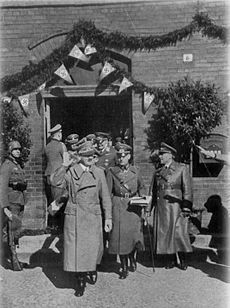
During 1938 and 1939, some officers planned to remove Hitler from power if he started a war over Czechoslovakia or Poland. Rundstedt knew about these plans. Beck tried to get him to join, knowing Rundstedt disliked the Nazi government. But Rundstedt firmly believed officers should not be involved in politics. However, he also did not report these plans to Hitler. Rundstedt was worried about attacking Czechoslovakia, fearing Britain and France would get involved and Germany would lose. He advised against directly opposing Hitler, fearing a new crisis between Hitler and the Army.
In November 1938, Rundstedt retired from the Army with the rank of Colonel-General. He was almost 63, not in good health, and wanted to spend time with his family. It seems Hitler did not force him out. Rundstedt remained on good terms with Hitler, who made him an honorary colonel of his old regiment. Rundstedt also agreed to return to active service if a war broke out.
World War II Campaigns
Invasion of Poland (1939)
Rundstedt's retirement was short. In early 1939, Hitler decided to confront Poland. Rundstedt was appointed commander of Army Group South to invade Poland from Silesia and Slovakia. His chief of staff was General Erich von Manstein.
Rundstedt's armies quickly moved into southern Poland. They captured Kraków on September 6. His forces helped destroy the Polish Poznan Army in the Battle of the Bzura. Warsaw surrendered on September 28. By October 6, fighting in southern Poland had stopped.
Invasion of France and the Low Countries (1940)
On October 25, Rundstedt became commander of Army Group A, facing the French border in the Ardennes mountains. His chief of staff was again Manstein.
Hitler's first plan for attacking France was similar to the 1914 invasion, with the main attack through Belgium. Most senior officers, including Rundstedt, disagreed with this plan and the timing. Manstein, supported by Rundstedt, argued for a different plan: a strong armored attack by Army Group A through the Ardennes to the sea. This would cut off British and French forces in Belgium. This "Manstein Plan" became the basis for the blitzkrieg of May 1940.
The attack began on May 10, 1940. By May 14, German armored forces had broken through the Allied front. The British and French had moved into Belgium and were in danger of being trapped. Both Hitler and Rundstedt worried about the armored forces getting too far ahead of their infantry support. On May 20, German tanks reached the sea at Abbeville, trapping the British and French armies.
At this point, the armored forces were stretched thin and had suffered losses. Rundstedt agreed to a pause for the units to recover. Hitler then ordered a halt, believing the Luftwaffe (German air force) could destroy the trapped Allied armies. This halt allowed the British Expeditionary Force and many French troops to be evacuated from Dunkirk. After the war, Rundstedt called the Halt Order "an incredible blunder" and blamed Hitler. However, the idea for a pause originally came from his commanders and himself.
The focus then shifted to attacking the French armies to the south. Rundstedt's attack began on June 9 and quickly broke French resistance. By June 12, his forces were across the Marne. French resistance crumbled, and on June 22, France requested an armistice. In July, Hitler promoted Rundstedt and several other commanders to the rank of Field Marshal. Rundstedt wanted to retire, but Hitler persuaded him to stay in France. He oversaw planning for the proposed invasion of Britain, Operation Sealion, but he did not believe it would happen. In October, Hitler appointed him Commander-in-Chief West (OB West).
Planning the War Against the Soviet Union (1941)
By July 1940, Hitler began planning the invasion of the Soviet Union, code-named Operation Barbarossa. Rundstedt learned he would command Army Group South, tasked with conquering Ukraine.
Rundstedt, like many German officers, had preferred good relations with the Soviets. He was also concerned about starting a new war in the east while Britain was still fighting. However, he did not oppose the plans. Most German officers shared Hitler's low opinion of the Soviet army. Hitler told Rundstedt, "You have only to kick in the door, and the whole rotten structure will come crashing down."
In March 1941, Rundstedt moved his headquarters to Breslau. He attended a conference in Berlin where Hitler told senior officers that the usual rules of warfare would not apply to the Russian campaign. He called it a "war of extermination."
The invasion was planned for May but was postponed until June due to bad weather. Rundstedt moved his headquarters to Tarnów in Poland. He commanded more than half of the German-Soviet front. His forces were to push into Ukraine, aiming to capture Kiev and trap Soviet forces west of the Dnieper.
Operation Barbarossa (1941)
The attack began on June 22. Despite warnings, Joseph Stalin and the Soviet command were surprised. The Germans quickly broke through border defenses. However, Soviet forces in Ukraine, led by Colonel-General Mikhail Kirponos, put up strong resistance. Rundstedt noted that Soviet tanks were better than German ones. He said after the war, "I realised soon after the attack that everything that had been written about Russia was wrong."
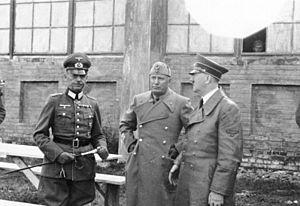
After ten days of fierce fighting, German armored forces broke through, reaching Zhitomir, close to Kiev, by July 12. By July 30, the Red Army in Ukraine was retreating. Rundstedt and his commanders believed they could capture Kiev quickly.
The campaign did not go exactly as planned. The Red Army was not destroyed, and the Soviet state did not collapse. Hitler decided to shift armored divisions to the north and south. Rundstedt benefited from this, as attention moved to the southern front. He also benefited from Soviet mistakes. Stalin ordered his forces to push forward to Kiev and Uman, risking encirclement, instead of retreating.
Rundstedt decided to change the direction of his armored forces towards Krivoy Rog. By July 30, the Germans were east of Uman, cutting off the Soviet retreat. On August 2, two German armies met, trapping over 100,000 Soviet troops. Southern Ukraine was left almost undefended. By August 25, the Germans had occupied everything west of the Dnieper. However, this took longer than expected. Rundstedt wrote to his wife on August 12, "How much longer? I have no great hope that it will be soon. The distances in Russia devour us."
After the Uman victory, Soviet forces gathered around Kiev, over 700,000 men. They were dangerously exposed. On September 12, German tanks crossed the Dnieper and linked up with other German forces on September 16, east of Kiev. Around 600,000 Soviet soldiers were killed or captured. Kiev fell on September 19. This was one of the greatest victories in military history. However, historians note that Stalin's stubbornness played a big role in this Soviet disaster.
By the end of September, Rundstedt was concerned about his command. His armies were exhausted after three months of fighting. The armored divisions needed new equipment. The weather was getting worse. Rundstedt wanted to stop at the Dnieper for the winter to allow his army to rest. But Hitler insisted on continuing the offensive.
Rundstedt's forces won another victory in October when they trapped two Soviet Armies around Mariupol, taking over 100,000 prisoners. This allowed the conquest of Crimea. However, the Russian winter began in mid-November. The Germans lacked food, fuel, and winter clothing. Rundstedt, who was 65 and not in good health, was under great strain. He was forced to launch a new offensive with exhausted troops in terrible conditions.
Kleist's forces attacked on November 17 and captured Rostov on the 21st. But the Soviets launched a counter-offensive on the 25th. On the 28th, Rundstedt allowed Kleist to withdraw from Rostov. When Hitler heard this, he ordered Rostov to be held. Rundstedt insisted on his decision and offered to resign if his leadership was not trusted. Hitler accepted his resignation on December 1, replacing him with Reichenau. This was the first major defeat for the German Army in World War II.
Hitler soon realized he had made a mistake. He visited Rundstedt's former headquarters and found that the withdrawal was necessary. Hitler met with Rundstedt and apologized, suggesting he take leave and return to service later. On December 5, Rundstedt left the Russian front.
Command in the West (1942-1944)
In March 1942, Hitler re-appointed Rundstedt as OB West, commander of German forces in the west. He returned to his headquarters in France. Rundstedt's knowledge of French and his good relationship with the French leader, Marshal Philippe Pétain, were helpful. However, Hitler saw Rundstedt as a figurehead and did not give him full authority. He had no direct control over the Navy, Air Force, or SS operations in France.
The situation in France had changed. The French Communist Party began active resistance against the Germans. This led to a cycle of attacks and retaliations. Rundstedt had no direct control over the Army's response to these attacks.
The entry of the United States into the war in December 1941 made an Allied invasion of France more likely. Hitler ordered the construction of the Atlantic Wall, a system of coastal defenses. German forces in France also grew. In November 1942, the Allies invaded French North Africa. Germany responded by occupying all of France.
In 1943, some German officers continued to plot against Hitler. They tried to persuade senior commanders like Rundstedt to lead a coup. Rundstedt refused to get involved, saying he was "too old and had had enough." His health was a concern, but he was still capable of clear thinking.
Defeat in Normandy (1944)
The Allied invasion of Italy in September 1943 meant France would not be invaded that summer. However, the large build-up of American troops in Britain meant a cross-channel invasion was coming in 1944. Rundstedt believed the invasion could only be defeated by a strong defense with armored reserves positioned inland. Hitler disagreed, insisting the invasion must be stopped on the beaches.
Hitler sent Field Marshal Erwin Rommel to France to speed up the Atlantic Wall's construction. Rommel became commander of Army Group B, covering northern France. This created a difficult command structure. Rommel wanted armored divisions close to the coast, while Rundstedt and General Leo Geyr von Schweppenburg wanted them inland for maneuverability. Hitler made a compromise: half the armor would be near the beaches, and half in reserve, but only Hitler could order the reserves to move.
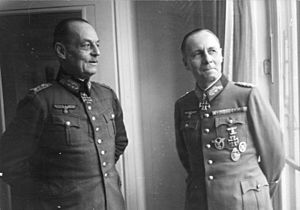
The invasion came on June 6, 1944, in Normandy, far from where Rundstedt and Rommel expected it. Rommel was on leave, and Hitler was asleep. Rundstedt, at 68, was up early, trying to understand the situation. He immediately saw that the airborne landings meant a seaborne invasion. He asked for authority to deploy the armored reserves, but Hitler's approval was needed. Hitler's refusal came at 10:00, and his change of mind at 14:30. By then, the Allies were well ashore.
Rundstedt ordered the Allies to be "wiped out before the day's end," but it was too late. Historians agree that if Hitler had released the armored reserves when Rundstedt asked, the Allies would have faced a much harder day.
By June 11, it was clear the Allies could not be pushed out of Normandy. Allied air superiority and French Resistance sabotage made it hard to bring armored reinforcements. Rundstedt and Rommel tried to persuade Hitler to withdraw from Normandy to a defensive line on the Seine, but Hitler refused any withdrawal. On June 17, Hitler met Rundstedt and Rommel. Both field marshals argued that the situation required massive reinforcements or a quick retreat. They also urged Hitler to find a political solution to end the war, saying it was unwinnable. Hitler ignored them.
On July 1, Rundstedt received an order from Hitler to countermand his own orders to allow armored units to withdraw from Allied naval gunfire. In anger, Rundstedt called Hitler's chief of staff, Wilhelm Keitel, and reportedly said, "Macht Schluss mit dem Krieg!" (End the war!). Keitel told Hitler that Rundstedt felt unable to cope, and Hitler relieved him of his command. Rundstedt was replaced by Kluge. It was officially announced that Rundstedt was retiring due to age and ill-health. Hitler sent him a "very cordial" letter and awarded him the Oak Leaves to his Knight's Cross of the Iron Cross. Rundstedt left France on July 4, saying he would never hold another military command.
Plot to Kill Hitler (1944)
Rundstedt had always refused to join plots against Hitler. He was not involved in the plot to kill Hitler with a bomb on July 20, 1944. When he heard about the attempt, he was very hostile to it. He later stated that he would never have thought of such a thing, calling it "base, bare-faced treachery." He also believed the plot would have failed because the German Army and people still supported Hitler. He felt his duty as a soldier was to obey orders.
After the plot failed, Hitler was determined to punish those involved. He ordered a "Court of Honour" to expel officers accused of involvement from the Army. Rundstedt was appointed to head this court. The court considered evidence from the Gestapo. No defense was allowed for the accused. Based on this, several officers were expelled from the Army. These officers were then tried by a special court and many were executed. Rundstedt's role in this process has been criticized by historians.
Return to the West (1944-1945)
After the July 20 plot, the German armies were in retreat in both the east and the west. In the west, the Allies swept across France, taking Paris on August 25 and Brussels on September 3. Hitler agreed to ask Rundstedt to return as OB West. Rundstedt accepted on September 1, saying, "My Führer, whatever you order, I shall do to my last breath."
Rundstedt's appointment was partly for propaganda. He was a very senior and well-known commander, and his reputation was meant to inspire confidence. The Allies believed he was a powerful strategist. However, Hitler saw Rundstedt as a figurehead. Operational control in the west remained with Field Marshal Walter Model. Rundstedt saw himself as a voice of experience, guiding Model.
Rundstedt believed a strong defensive line could only be established on the Rhine, but Hitler refused to give up German territory. He insisted on defending the West Wall. The German forces were weak, made up of patched-up divisions and new units of older men and teenagers.
However, the Germans now had some advantages. It is easier to defend a fixed line. They were fighting on their own land, which boosted morale. They were also closer to their supply bases. The Allies had long supply lines. The Allied offensive slowed down and halted in October. The British attempt to cross the Rhine at Arnhem (Operation Market Garden) failed in late September. This gave Rundstedt time to strengthen his position.
Ardennes Offensive (1944-1945)
Hitler did not want to stay on the defensive. By October, he planned a counter-offensive in the Ardennes, aiming to split the British and American fronts and recapture Antwerp. On October 27, Rundstedt and Model told Hitler's chief of operations, General Alfred Jodl, that they thought this was impossible with the available forces. They suggested a smaller attack. But Hitler insisted on his plan.
Rundstedt refused to attend a meeting with Hitler on December 2, saying he hated listening to Hitler's long speeches. This showed he was becoming more of a figurehead. After the war, he denied responsibility for the offensive. Hitler arrived on the western front on December 10 to oversee the offensive, which began on December 16. Hitler gave orders directly to the army commanders, bypassing Rundstedt and Model.
The offensive, known as the Battle of the Bulge, initially made progress due to surprise and bad weather. But the Allies reacted quickly. German forces fell behind schedule. By December 25, the main German advance was still far from Antwerp. The strong resistance of the American garrison at Bastogne greatly delayed the attack. When the cloud cover lifted on December 24, Allied air forces attacked with great effect. Rundstedt urged Hitler to halt the offensive, fearing it would become a "second Stalingrad," but Hitler refused.
On January 8, Hitler allowed a withdrawal. By the end of January, the Germans were back where they started. The offensive had used up Germany's last reserves of men, equipment, and fuel. As a result, neither the West Wall nor the Rhine could be properly defended.
Defence of the Rhine and Final Dismissal (1945)
On February 18, as the Allies entered Germany, Rundstedt appealed to the German Army to resist. Hitler rewarded his loyalty. Despite fierce resistance, the Germans were pushed back from the West Wall in February. Allied offensives drove them across the Rhineland towards the Rhine. On March 2, the Americans reached the Rhine near Düsseldorf.
Rundstedt had planned to blow up the many bridges over the Rhine to deny them to the enemy. However, on March 7, these plans failed when the Americans captured the Ludendorff Bridge at Remagen intact. This allowed them to quickly establish a foothold on the eastern bank. This was not Rundstedt's fault, but Hitler needed a scapegoat. On March 9, Hitler phoned Rundstedt and told him he would be replaced by Albert Kesselring. This ended Gerd von Rundstedt's 52-year military career.
On March 11, Rundstedt had a final meeting with Hitler, who thanked him for his loyalty. Rundstedt then returned to his home in Kassel. However, due to bombing and the Allied advance, he moved his family several times, finally settling at a sanatorium in Bad Tölz. He stayed there until American forces occupied it on May 1, the day after Hitler's death. That evening, he became a prisoner of war.
After the War
In Custody
Field Marshal von Rundstedt was first held at an Allied facility in Luxembourg. His son, Hans Gerd, was allowed to stay with him due to his father's rank and health. They were later moved to an American detention center in Wiesbaden. Rundstedt was questioned about his career and actions during the war. Decisions were being made about which German leaders would be tried for war crimes at the Nuremberg trials. Rundstedt was the most senior German officer in Allied custody.
Eventually, the International Military Tribunal (IMT) decided that no German field commanders would be tried individually at Nuremberg. Instead, the "General Staff and High Command of the German Armed Forces" was indicted as a group.
In July, Rundstedt was transferred to British custody. He was held in various locations in England and Wales. The British climate worsened his arthritis, and his heart condition became more severe. He was interviewed by military writer Basil Liddell Hart, who later used these interviews for his books. Liddell Hart and Rundstedt developed a good relationship.
Defence Witness at Nuremberg
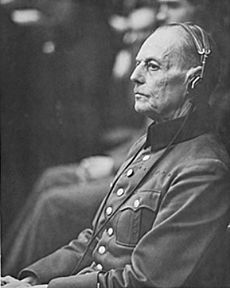
When Rundstedt learned he would not be tried personally, he asked to appear as a defense witness for the Army high command. In May 1946, he was called to appear. On June 19, he testified before a preliminary hearing. He stated that the high command played no part in the decisions to invade countries. He insisted that the Army had followed the laws of war.
On August 12, Rundstedt testified before the IMT itself. He stated that military law was "always binding for us older leaders" and that officers who broke these laws were punished. He said, "As senior soldier of the German Army, I will say this: we accused leaders were trained in the old soldierly traditions of decency and chivalry. We lived and acted according to them, and we endeavoured to hand them down to the younger officers." He maintained that senior commanders discussed only military operations, while political and strategic decisions were made by Hitler. Rundstedt made a good impression as a witness.
In October 1946, the IMT announced its verdicts. The Army high command as a whole was found not to be a criminal organization. However, the Tribunal stated that these men had "been a disgrace to the profession of arms" and "were guilty of crimes and should be brought to trial as individuals." This meant Rundstedt could still face individual prosecution.
Last Years
Rundstedt was released after four years in custody. He was 73, frail, and in poor health. He had no home or income. His family home had been taken, and his estate was in the Soviet Zone. His money was frozen because he was still classified as a war criminal by the Americans. He wrote to Liddell Hart, "It is an awful situation for me and my poor wife. I would like to end this life as soon as possible."
He and his wife were temporarily housed in an elderly persons' home. In his last years, Rundstedt became a subject of interest for writers and historians. His former chief of staff, Günther Blumentritt, wrote a biography about him. In 1951, he was portrayed positively in a film about Rommel. Blumentritt and Liddell Hart raised money to help the Rundstedts with nursing care.
His wife, Bila, passed away on October 4, 1952. Gerd von Rundstedt died of heart failure on February 24, 1953, in Hanover. He was buried in the Stöcken City Cemetery.
Dates of Rank
| Rank | Insignia | Date |
|---|---|---|
| Leutnant | June 17, 1893 | |
| Oberleutnant | October 1, 1901 | |
| Hauptmann | March 24, 1909 | |
| Major | November 28, 1914 | |
| Oberstleutnant | October 1, 1920 | |
| Oberst | March 1, 1923 | |
| Generalmajor | November 1, 1927 | |
| Generalleutnant | March 21, 1929 | |
| General der Infanterie | October 1, 1932 | |
| Generaloberst | March 1, 1938 | |
| Generalfeldmarschall | July 19, 1940 |
Awards
- Waldeck Merit Cross 4th Class
- Clasp to the Iron Cross (1939) 2nd Class (September 16, 1939) & 1st Class (September 21, 1939)
- Knight's Cross of the Iron Cross on September 30, 1939, as Colonel-General and commander in chief of Army Group South
- 519th Oak Leaves on July 1, 1944, as Field Marshal and Commander in Chief West
- 133rd Swords on February 18, 1945, as Field Marshal and Commander in Chief West
Images for kids
-
Rundstedt in the center, with Erwin Rommel (left), Alfred Gause (right) and Bodo Zimmermann (in background)
See also
 In Spanish: Gerd von Rundstedt para niños
In Spanish: Gerd von Rundstedt para niños
- Bribery of senior Wehrmacht officers
- Severity Order


